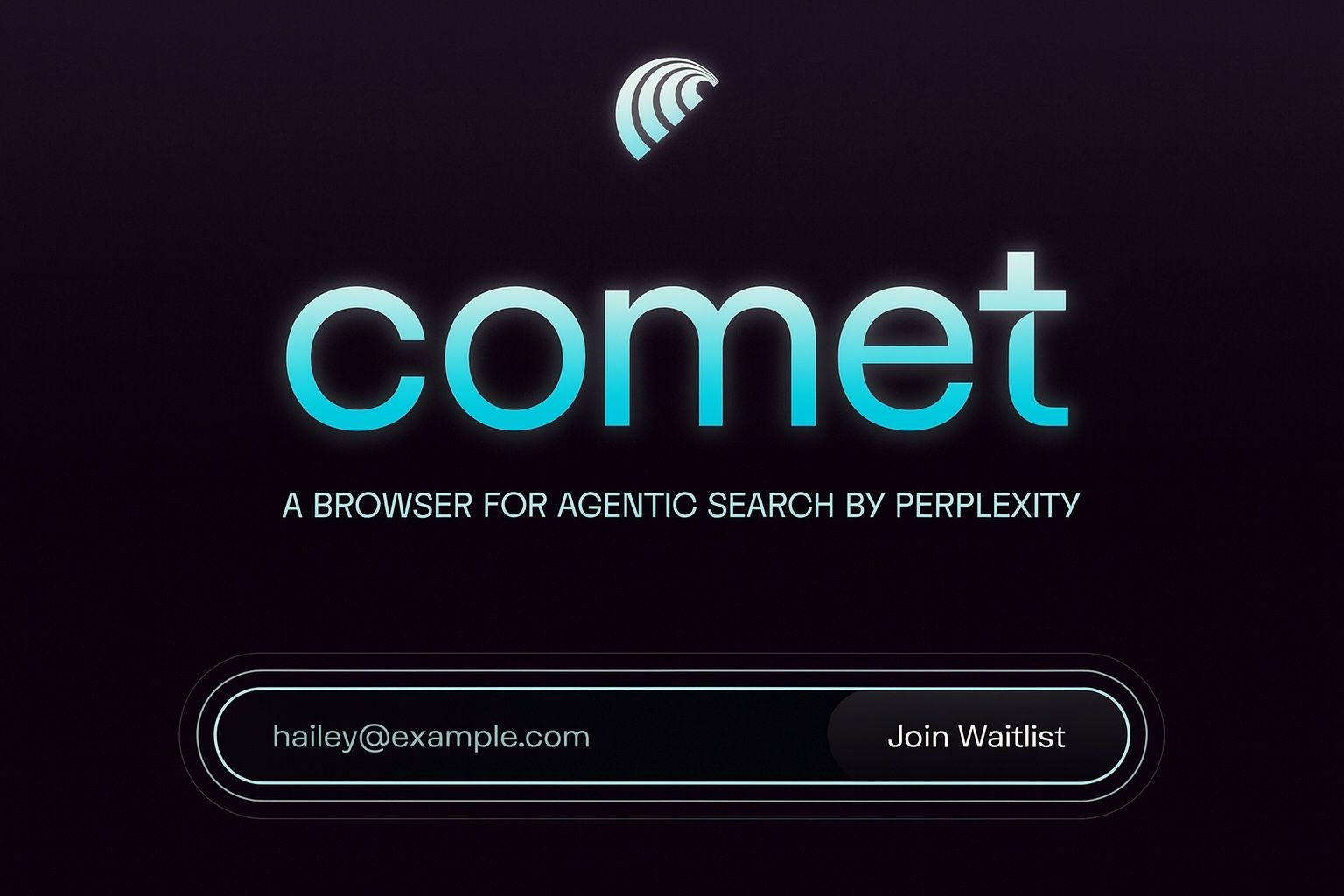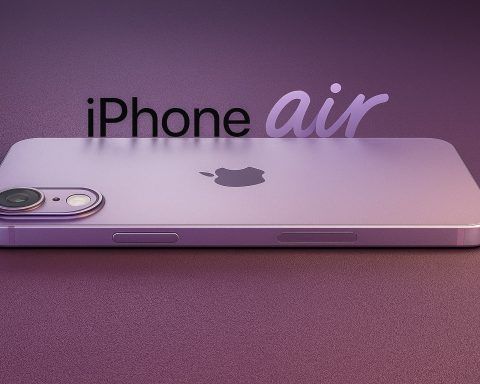- Comet – An AI-Powered Browser: Comet is an AI-centric web browser developed by Perplexity AI, designed to integrate an AI assistant into the core browsing experience. It launched globally in beta in July 2025 and is built on Perplexity’s conversational AI search engine economictimes.indiatimes.com indianexpress.com. The browser features a constantly active sidebar powered by OpenAI’s GPT-4, enabling complex multi-step tasks like page summarization, email drafting, and even executing transactions – all within the browser interface financialexpress.com timesofindia.indiatimes.com.
- India Launch (Sept 2025): Perplexity officially released the Comet browser in India on September 24, 2025, marking one of its most ambitious market expansions moneycontrol.com. The launch targets India’s vast, tech-savvy user base and comes with a major catch: Comet is only available to paying Perplexity Pro subscribers in India (approximately ₹17,000 per year) – free users cannot currently access it financialexpress.com. To spur adoption, telecom giant Bharti Airtel is offering its customers one year of Perplexity Pro for free financialexpress.com, reflecting the strategic importance of India’s market.
- Platform Availability: As of launch, Comet supports Windows and macOS desktops, with mobile versions on the way indianexpress.com moneycontrol.com. Android users in India can pre-order the Comet app on Google Play, though no firm release date is listed yet indianexpress.com. An iOS version is under development financialexpress.com. Early access had initially been limited to Perplexity’s highest-tier “Max” subscribers, but the India rollout extends availability to Pro subscribers as part of rapid expansion plans financialexpress.com financialexpress.com.
- AI Assistant & Unique Interface: Comet’s built-in Comet Assistant acts as a personal AI agent that automates routine online tasks. Unlike traditional browsers with rows of tabs, Comet introduces a workspace interface that consolidates information in one view instead of separate tabs indianexpress.com economictimes.indiatimes.com. The AI assistant “lives” in a sidebar and can manage tabs, summarize webpages or even emails, handle calendar events, and navigate websites via text commands indianexpress.com economictimes.indiatimes.com. It learns from the user’s browsing history and context to offer relevant recommendations, effectively acting as a research and productivity aide financialexpress.com.
- “Browsing to Thinking” – Advanced Capabilities: Perplexity describes Comet as shifting the paradigm from browsing to “thinking” moneycontrol.com. The AI-driven sidebar isn’t just for answering questions – it can execute agentic actions across the web on your behalf. For example, Comet can compare product prices across sites, book meeting slots, draft and send emails, or even fill a shopping cart and initiate checkouts, all through AI instructions moneycontrol.com timesofindia.indiatimes.com. This goes well beyond the simple page summaries of ChatGPT plugins – Comet’s agent can perform transactions and multi-step workflows that traditionally required manual user effort.
- Privacy and Security Measures: Given its deep integration, Comet stores user browsing data and AI interactions locally on the device with end-to-end encryption by default moneycontrol.com. It supports third-party password managers and is marketed as enterprise-compliant, aiming to assure businesses and privacy-conscious users. Notably, researchers from Brave revealed a prompt injection vulnerability in August 2025 that could potentially trick the Comet AI into revealing sensitive info (like emails or passwords) by malicious page content indianexpress.com indianexpress.com. Perplexity claims to have patched the issue in collaboration with Brave, though the researchers noted the exploit persisted in further tests indianexpress.com – highlighting the new security challenges of AI-native browsers.
- Competition Heats Up: Comet’s India debut comes amid an “AI browser war” with both startups and tech giants in the fray. Perplexity (backed by $500M in funding and valued around $14 billion indianexpress.com) is positioning Comet as a challenger to Google’s Chrome dominance timesofindia.indiatimes.com. Rivals are also rolling out AI-enabled browsers: Microsoft’s Edge now integrates Bing Chat as a Copilot sidebar for page summaries and writing help privateinternetaccess.com; Opera’s latest Opera One browser comes with a free built-in AI assistant “Aria” capable of real-time web answers and agentic tab management opera.com opera.com; and The Browser Company (makers of Arc) has pivoted to a new AI-first browser called “Dia” with features like chatting with your tabs rogerwong.me rogerwong.me. Even OpenAI is reportedly developing its own AI web browser that could autonomously book travel or manage finances indianexpress.com. Comet enters this arena aiming to differentiate with a more comprehensive workflow automation approach, essentially serving as a “thinking partner” in the browser moneycontrol.com.
Perplexity’s Comet Browser: AI + Search Engine = A New Way to Web Surf
Perplexity’s Comet is not just another Chrome or Firefox – it’s an AI-native browser built from the ground up to weave a digital assistant into your everyday web tasks. The startup behind it, Perplexity AI, first gained notoriety for its AI-powered answer engine that competes with Google Search indianexpress.com. With Comet, Perplexity has extended that technology into a full browser, betting that the browser itself can become a productivity and research assistant. “Comet is built on Perplexity’s AI search engine” and is designed to make internet work and research more efficient, explains CEO Aravind Srinivas economictimes.indiatimes.com.
Unlike standard browsers that passively display websites, Comet comes alive with an AI sidebar omnipresent on the screen moneycontrol.com. This sidebar runs on OpenAI’s latest GPT model and Perplexity’s own large language model (LLM) integration. It has awareness of the page you’re on and even multiple pages at once. The user can ask the AI assistant questions or give it commands related to the content in their tabs. For example, if you’re reading a dense article or a 20-minute video, you can ask Comet to summarize it in seconds rogerwong.me. You can highlight text and have the AI explain or translate it. But Comet goes further – the assistant can take actions through the browser, not just chat.
One of Comet’s signature features is its “Workspace” interface. Instead of the typical row of independent tabs, Comet organizes browsing into a scrollable, contextual workspace indianexpress.com. All the information you need for a task – web pages, documents, emails – can be collected in one area, and the AI helps you navigate and manage it. This aims to reduce the notorious “tab overload” many users face. As The Indian Express notes, Comet’s workspace lets you access everything in one place without constantly switching tabs economictimes.indiatimes.com. The AI keeps track of what you’ve read or worked on, and uses that context to suggest relevant information proactively indianexpress.com indianexpress.com. In essence, Comet attempts to understand what you’re doing online and assist dynamically, rather than waiting for you to manually search or click around.
Another key component is the Comet Assistant – the AI agent that can act on your instructions. Perplexity refers to this as an “agentic AI” capability, meaning the AI can autonomously perform multi-step tasks on your behalf financialexpress.com. For instance, if you were comparing products across different shopping sites, you could simply tell Comet, “Find the best price and buy this item,” and it could carry out the steps: search multiple sites, read reviews, add the item to cart, and even proceed to checkout – all in one guided workflow. The Financial Express reports that Comet’s sidebar can automate a wide range of functions: comparing product prices, summarizing or analyzing lengthy documents, scheduling meetings in your calendar, drafting and sending emails, and even completing online transactions like bookings or purchases financialexpress.com moneycontrol.com. This is a significant leap beyond what tools like ChatGPT or Bing Chat alone can do, because Comet is directly plugged into your browsing sessions, with access to logged-in services (with your permission).
To illustrate the power of this agent, early users have shared remarkable examples. In one test, a user opened several restaurant pages and asked Comet: “Find me the highest rated sushi restaurants in San Diego that have a table for two at 7 PM next Friday on OpenTable, and then rank them by Yelp rating.” The Comet assistant autonomously searched OpenTable for availability, cross-checked Yelp for reviews, and returned a ranked list of restaurants – essentially doing the legwork of concierge-style research across sites rogerwong.me. Taking it a step further, the user could say “Book a table at Restaurant X,” and Comet would navigate to complete the reservation. In another real example, a user tasked Comet with unsubscribing from several marketing emails: the AI agent went into Gmail, opened each selected email, clicked the unsubscribe links, and attempted to complete the process for each – successfully handling two out of three emails entirely on its own rogerwong.me. This level of automation of browsing tasks is what sets Comet apart: it’s not just answering questions, it’s performing actions that normally require a human clicking and typing. Perplexity’s tagline for Comet – “from browsing to thinking” – encapsulates this shift moneycontrol.com.
Comet’s interface features an AI sidebar (right) that can answer questions and perform actions using the context of open webpages. In this example, the user asked about Perplexity’s CEO and the assistant provided an answer drawn from the article on the left rogerwong.me rogerwong.me. Such tight integration of browsing and AI assistance is the hallmark of the Comet browser.
Behind the scenes, Comet runs on a Chromium foundation timesofindia.indiatimes.com – meaning it can leverage Chrome’s web engine for compatibility with websites and even supports regular Chrome extensions timesofindia.indiatimes.com timesofindia.indiatimes.com. This is a strategic choice: users switching to Comet don’t have to sacrifice their favorite extensions or familiar UI elements. Comet looks and feels enough like a normal browser (address bar, back button, etc.), but adds these intelligent layers on top. The AI’s ability to use your logged-in context (with your authorization) is another differentiator. Comet can pull information from platforms where you’re signed in – for example, it could answer, “When is my next meeting?” by checking your Google Calendar, or “Summarize any unread emails from today” by scanning your Gmail (with appropriate permissions) indianexpress.com. Perplexity emphasizes that the assistant only has access to data in services where you are already authenticated and that data remains on your device, processed locally or on secure servers with encryption moneycontrol.com indianexpress.com. This design underscores both the power and the privacy challenges of such AI agents – they have to see a lot of potentially sensitive data to help you, which means security must be airtight.
Launching in India: Strategy Behind the Rollout
Perplexity’s decision to launch Comet in India is a calculated move that highlights the country’s importance in the global tech landscape. India is the world’s second-largest internet market with over 800 million users, many of whom are mobile-first and increasingly adopting AI-driven services. “India’s digital market has become an increasingly contested battleground for AI players,” notes Moneycontrol, adding that by introducing Comet in India early, Perplexity hopes to stand out with a product offering “less clutter, more automation, and an AI that doesn’t just answer queries but handles the entire workflow” moneycontrol.com moneycontrol.com. In other words, India is the perfect proving ground for Comet’s value proposition: a huge, diverse user base hungry for productivity tools, where even a small slice of market share could translate to tens of millions of users.
Why India first? For one, Perplexity has already been making inroads in the country. The startup partnered with Bharti Airtel, one of India’s top telecom carriers, to offer Perplexity’s Pro subscription to millions of Airtel customers for free for one year moneycontrol.com. This kind of deal massively lowers the barrier for users to try Comet – an Airtel customer can get the otherwise ₹17,000/year Pro tier at no cost and download Comet right away. It’s effectively a large-scale beta test and user acquisition strategy. Perplexity is also hiring talent in India, signaling “deeper local investment” and an intent to possibly establish R&D or support operations there moneycontrol.com. CEO Aravind Srinivas, who announced the India launch on X (formerly Twitter), positioned Comet not just as another app but as a “thinking partner” for users moneycontrol.com. This phrasing is telling – Perplexity is trying to market Comet as a utility that augments the user’s mind, which could resonate strongly in a market where students, professionals, and a booming creator economy are always looking for an edge in efficiency.
There’s also a defensive angle to launching in India: Big Tech competitors like Google, Microsoft, and OpenAI are all vying to capture the Indian AI user base. Google has a dominant presence (Android, Chrome, Search) and is integrating AI into those platforms; Microsoft via LinkedIn and GitHub has reach among professionals and has been pushing Bing AI and Windows Copilot globally. By moving fast in India, Perplexity aims to build brand recognition and possibly loyalty before these giants roll out their next wave of AI features. It’s a chance to define what an “AI browser” is in the minds of users early on. As Financial Express observed, this launch is part of Perplexity’s broader effort to challenge Google’s search and browser dominance financialexpress.com. Notably, Reuters reported that Perplexity has been in talks with smartphone makers to pre-install Comet on devices indianexpress.com – a move that could be game-changing if successful, since being the default browser could bring huge user adoption. Srinivas conceded it’s an uphill battle: “It’s not easy to convince mobile OEMs to change the default browser to Comet from Chrome,” he told Reuters, highlighting how ingrained Google’s browser is on Android phones indianexpress.com. Still, the fact that such discussions are happening (with rumored talks involving Samsung and even Apple for AI integrations indianexpress.com) shows the level of ambition at play.
From a business model perspective, Perplexity is using a freemium strategy with a twist. Comet is free to use only if you are a paid subscriber to Perplexity’s service – specifically at the Pro (or Max) tier financialexpress.com. This is somewhat paradoxical (“free for paying users”), but essentially Comet is bundled as a premium feature. An annual Pro subscription in India costs roughly ₹17,000 (around $200 USD) financialexpress.com, which is a high bar for the average consumer. Why would users pay for a browser when all other major browsers are free? Perplexity is betting that the AI capabilities are compelling enough to justify the cost for power users who depend on research, content creation, or data-heavy workflows. In India, the Airtel partnership mitigates this cost for a large swath of users (Airtel reportedly has over 300 million subscribers). By the time the free year lapses, Perplexity hopes Comet will have demonstrated enough value that some users convert to paid. It’s a risky gamble in a price-sensitive market, but it also cleverly uses corporate partnerships to subsidize user access.
Early indicators suggest strong interest: Perplexity’s announcement on social media drew curiosity, and the Times of India noted that Comet’s target audience is professionals like researchers and content creators who might readily invest in such a tool timesofindia.indiatimes.com. Perplexity’s internal goals are very aggressive – the company aims to reach “tens to hundreds of millions” of users in the next year, up from a base of a few hundred thousand early testers indianexpress.com indianexpress.com. Achieving that would likely require expanding access beyond just paid tiers or nailing more bundle deals (perhaps with other telecoms or enterprise clients). It may also require launching free or ad-supported versions in the future. But for now, India is effectively the launchpad where Perplexity is testing whether users will embrace an AI-first browsing paradigm enough to pay for it.
Features and Capabilities: What Makes Comet Different?
At its core, Comet is defined by the deep integration of an AI agent into every browsing activity. Here’s a breakdown of its standout features and why they matter:
- AI Sidebar “Copilot”: Every Comet window includes a right-hand sidebar that serves as your AI copilot. This assistant is context-aware – it knows what website or document you’re viewing and can pull in information from multiple open pages. You can interact with it in natural language, asking anything from “Summarize this 10-page PDF for me” to “Find the main argument of this news article” or “Translate this paragraph to Spanish.” The sidebar can also draft content: if you need to respond to an email or create a social media post, you can ask Comet to whip up a draft right in the browser. Microsoft’s Edge browser and Opera have introduced similar sidebars, but Comet’s is always-on and far more agentic. It’s not just answering questions; it can click links, scroll pages, and basically drive the web on your behalf under the hood financialexpress.com moneycontrol.com. A Moneycontrol review described Comet as blending a “standard web interface with an always-on AI sidebar” that can “carry out multi-step workflows” and act like a research assistant moneycontrol.com.
- Agentic Task Automation: The term “agentic AI” refers to AI that can make decisions and take actions to accomplish goals. Comet leans fully into this concept. For example, if planning a trip, you could instruct: “Find me a flight next weekend to London under $800, book it, and then book a hotel in Kensington rated 4 stars or above.” In a traditional setting, you’d search flights, filter results, pick one, then go to a hotel site, repeat the process – multiple searches, comparisons, and transactions. Comet’s agent could theoretically handle the whole chain: searching, comparing, and presenting you with the best options, then completing the bookings once you confirm. Opera has demonstrated a similar idea with its upcoming Browser Operator feature (at Opera’s event, they showed an AI agent booking a complex multi-city travel itinerary and ordering flowers online via Opera’s browser) spectrum.ieee.org. Comet is among the first real products to attempt this level of hands-free browsing for general users. The browser’s design allows these agents to interact with web page DOM elements directly (behind the scenes, it’s clicking buttons and filling forms as if a very fast, tireless user). One important safety aspect: Comet visually indicates when the AI is autonomously controlling a page (for instance, with a colored glow or an icon), and users can intervene or stop the agent at any time rogerwong.me. This ensures the human is still ultimately in control, preventing the AI from, say, accidentally ordering 100 items on Amazon due to a misinterpreted command.
- Workspace Instead of Tabs: Comet rethinks the venerable browser tab. Instead of dozens of tabs cramped at the top of your window (which many of us struggle with), Comet offers Workspaces – an interface where content is stacked or tiled in a single pane for a given project or task. You might have a workspace for “Trip Planning” with your flight search, hotel page, and travel article all accessible together, and another workspace for “Work Project” with research papers and a Google Doc. The idea is to maintain context: everything related to a task is in one place, and the AI assistant is aware of everything in that workspace. If you ask it a question, it can draw from any of those open sources. This reduces context switching and the cognitive load of remembering which tab had which info. Perplexity highlights this as a major productivity feature – no more hunting through 20 tiny tabs to find the one you need indianexpress.com economictimes.indiatimes.com. Instead, you scroll or search within a workspace, or ask the AI to surface the info. It’s a bit like having a smart digital office where all your reference materials are laid out and a virtual assistant is ready to fetch any detail from them on request.
- Personalized Recommendations: By virtue of handling your web searches, reading habits, and tasks, Comet’s AI can start to anticipate what you might need next. The browser quietly learns from your behavior (stored locally, according to the company moneycontrol.com) – things like what topics you research often, what style of content you prefer, or when you tend to do certain tasks. Using this, Comet will recommend relevant content proactively. For instance, if you’re researching a topic across multiple sites, Comet might suggest a highly cited paper or a summary from its AI that could help. If you have an upcoming meeting (from your calendar) and you’re browsing related documents, it might highlight key points or even suggest questions to ask in the meeting, drawn from the material. The Times of India notes that Comet uses AI to suggest “relevant content, articles, and products based on user behavior and browsing habits,” making the experience more personalized timesofindia.indiatimes.com. This is similar in spirit to how YouTube or Netflix recommend content, but here it’s about productivity – suggesting the next useful thing to read or do in the context of your current workflow.
- Email and Calendar Integration: Many people spend a large chunk of their day in email and schedule managers. Comet’s assistant can plug into those as well (with permission). It can summarize long email threads, draft replies based on your previous writing tone, or extract action items from a messy email chain. In fact, alongside the India launch of Comet, Perplexity also introduced a standalone Email Assistant tool for managing Gmail/Outlook inboxes (though that particular tool is exclusive to the ultra-expensive Max plan at $200/month) economictimes.indiatimes.com. The philosophy carries into Comet: let the AI handle the grunt work of reading and organizing communications. You could instruct Comet, “Schedule a Zoom meeting with Alice and Bob next week,” and it could check everyone’s availability (if calendars are shared), pick a slot, send invites, and brief you on the agenda beforehand. It’s a glimpse of a near-future where a lot of digital busywork (scheduling, confirming, reminding, etc.) is offloaded to an AI. During Comet’s onboarding, the browser even shows examples like “reply to these emails” or “set up a meeting”, indicating these are key use cases being pushed to new users rogerwong.me rogerwong.me.
- Knowledge and Writing Aids: Since the AI has the whole web at its disposal (via Perplexity’s search), it doubles as a research librarian. It can fact-check statements, find sources, or even generate content for you. For content creators, Comet offers tools for multimedia and content generation – for example, writing assistance to draft blog posts, or summarizing research findings into bullet points timesofindia.indiatimes.com. The Times of India article mentions Comet includes features like real-time fact-checking, content generation, and even multimedia support for creators timesofindia.indiatimes.com. We can infer this means the AI can possibly analyze images or videos (to some extent) or at least integrate with image generation (Perplexity might leverage an image model for users to create visuals – though details are sparse, Opera’s Aria can generate images via a built-in DALL-E, so Comet might have something similar). At minimum, Comet can save time by generating outlines, summaries, or even slide decks (one can imagine hooking it into tools like PowerPoint via web if allowed).
All these features come together to position Comet not just as a browser, but as a productivity platform. It blurs the line between a web browser, a search engine, and a digital assistant. Naturally, this raises the question: how does Comet fare against existing browsers that are adding their own AI features? And can it convince users to break old habits?
Comet vs. Other AI-Powered Browsers and Assistants
The emergence of Comet is part of a broader trend in 2024–2025: browsers are getting “smarter” and more assistant-like across the board. Here’s how Comet compares to some notable peers in the AI-enabled browsing space:
Arc Browser & “Dia” by The Browser Company
Arc is an innovative browser from The Browser Company that gained a cult following for reimagining browser design (with a sidebar of tabs, spaces for different contexts, etc.). In late 2023, Arc introduced Arc Max, a suite of AI features that integrated OpenAI’s GPT into the browser – allowing users to chat with an AI about webpages, get summaries, and even rename tabs intelligently arc.net. However, by mid-2025, The Browser Company decided to take an even bolder step: they paused active development on Arc in favor of building a new AI-native browser codenamed “Dia.” The company’s CEO Josh Miller has described Dia as the future direction, essentially an Arc 2.0 built around AI from the start rogerwong.me.
Dia (currently in invite-only beta for Arc users as of July 2025) has a very similar philosophy to Comet. It offers a chat sidebar that can summarize or discuss the content of your open tabs, and you can even bring multiple tabs into a single conversation by @-mentioning them rogerwong.me. A New York Times piece on Dia gave an example of summarizing a 22-minute YouTube video via the AI – something Comet’s assistant can also do rogerwong.me. Where Dia differs is that it started from Arc’s baseline: initially, testers found that while Dia could chat about pages, it lacked some of Arc’s beloved UI features (which they’ve been quickly adding back) rogerwong.me. One tech reviewer noted that Dia’s chat felt like “an incremental step up from ChatGPT” because it mostly stays within the bounds of what you explicitly feed it (your open tabs) rogerwong.me. In his words, it helps digest information but is somewhat limited in taking initiative – which is where he felt Comet leaped ahead rogerwong.me rogerwong.me.
Crucially, Arc/Dia currently don’t automate multi-step tasks the way Comet does. Dia’s focus is “chat with your tabs” – hugely useful, but you’re still the one executing any actual actions based on that info. Comet’s focus is “let me do it for you.” For example, Dia might summarize a shopping page, but Comet might actually go through the checkout for you. The Browser Company may well add more agentic features to Dia (their team certainly has that vision, given Arc’s ethos of boosting user productivity), but as of now Comet holds an edge in agent autonomy. Both Comet and Dia share a similar challenge: they’re new browsers trying to lure users away from Chrome/Safari/Firefox. Arc at least had a head start with a few hundred thousand users and a buzz among designers and Mac enthusiasts; Comet is newer on the scene but is leveraging a well-funded AI startup and a big market launch.
It’s worth noting the philosophical overlap: Both companies see the browser as the next logical home for AI assistants. As one early Comet/Dia tester quipped, “the future of web browsing is obviously AI-assisted, because it feels so natural” rogerwong.me. The competition between Comet and Dia (and any others that join the fray) should benefit users through rapid innovation – we’re essentially seeing the dawn of AI-native browser UX, and the playbooks are still being written.
Opera’s Aria and AI-Upgraded Opera Browser
Opera, the veteran browser maker, has embraced AI in a big way and arguably was one of the first to build an embedded AI assistant into a mainstream browser. In early 2023, Opera introduced Aria, a free browser AI powered by a mix of OpenAI’s GPT and Opera’s own models opera.com opera.com. Aria is available on both Opera’s desktop browser and the mobile versions (including Opera GX for gamers and the popular Opera Mini) without any extra charge or subscription opera.com opera.com. This broad availability immediately gave Opera an edge in reaching users with AI features, especially since Opera Mini has tens of millions of users in regions like Africa and Asia spectrum.ieee.org.
Aria functions similarly to Bing Chat or Google’s Bard, but is built into the browser UI. Users can hit Ctrl+/ to bring up Aria’s command line and ask anything, or use the sidebar chat interface opera.com opera.com. Opera has been iterating on Aria, adding what they call “AI Prompts” or Tab Commands – essentially letting Aria manage your tabs and browser settings via natural language opera.com. For example, you can tell Aria “close all tabs that are playing music” or “group my tabs by topic” and it will execute those actions opera.com. Opera even integrated a feature for Aria to rearrange and organize messy tabs on command, showcasing it as putting “agentic AI to work for you” in tidying up your browser opera.com.
Where Opera is heading sounds a lot like Comet’s territory. In mid-2025, Opera announced a concept called “Browser Operator”, aiming to enable agent-based browsing similar to what Comet does spectrum.ieee.org. At an Opera event, their team demonstrated Aria booking a complex flight itinerary and ordering items online purely through AI commands spectrum.ieee.org. This is clearly the same fundamental idea: AI agents handling multi-step tasks. Opera’s advantage is that it can roll this out to its existing user base (hundreds of millions, including Opera Mini users) and it’s free. The company explicitly says Aria is free to use with “no login required” (though if you log into an Opera account you get additional features) opera.com opera.com. Opera’s challenge, however, is that its market share in many Western markets is small – it’s bigger in regions like India, Africa, and parts of Europe. Still, if Opera provides a comparable AI experience without cost barriers, Comet could feel pressure to eventually open up a free tier.
Comparing features: Comet and Opera’s Aria both leverage OpenAI’s tech under the hood, but Opera might not (yet) store as much personal context for the AI to use. Opera prioritizes real-time web access and some content generation (it even has a built-in AI image generator via Stable Diffusion/DALL-E on desktop) opera.com opera.com. But Opera’s AI likely isn’t combing through your emails or doing deep integrations into other apps at this point, whereas Comet is explicitly built to mesh with your data and workflow. Another difference is target audience and positioning: Opera frames Aria as a helpful addon to enhance browsing (like “get answers, chat, create with AI in Opera”), while Comet is presented as a full reinvention of what browsing is. One isn’t necessarily better than the other – many users might prefer a lightweight assistant in a familiar browser (Opera’s approach) to switching to a whole new browser for a more heavy-duty assistant (Comet’s ask).
From a user perspective, Opera’s solution is the most accessible: free, available on all platforms (Aria even works in Opera’s iOS and Android apps now), and with no sign-up friction in many cases opera.com. Comet, conversely, currently requires committing to a paid plan and using a desktop-only app for now. So Comet will likely focus on power users and enterprise customers in the near term, while Opera’s Aria can capture casual users who just want a taste of AI in their browser. It will be interesting to see if Opera’s forthcoming agentic features match Comet’s complexity; if they do, Opera could emerge as a strong competitor offering “Comet-like” capabilities in a free package.
Microsoft Edge with Bing Chat (Copilot)
When it comes to big players infusing AI into browsers, Microsoft Edge stands out. In early 2023, Microsoft leapfrogged others by integrating Bing Chat (powered by GPT-4) into the Edge browser’s sidebar. Later, with the wave of “Copilot” branding in Windows 11, this feature became known simply as Edge Copilot. Every Edge browser now has a built-in AI assistant that can be opened with a click – and it’s free for all users (with an optional sign-in to a Microsoft account for full functionality).
Edge’s Copilot can do a lot of what Comet’s assistant does in terms of reading and writing. It can summarize web pages, generate drafts of emails or posts, compare items (if you prompt it properly), and answer general knowledge questions – all in a conversational interface pinned to your browser window. It also has a “compose” mode to help you write emails, blog posts, etc., and an “insights” mode for context-aware suggestions. For example, if you visit a product page, it might automatically offer a summary or pros/cons list. According to a comparison by Private Internet Access, Edge’s sidebar Copilot provides “helpful summaries, AI-generated responses, and side-panel browsing” for quick lookups and productivity, integrated directly alongside your web content privateinternetaccess.com privateinternetaccess.com.
However, Edge’s AI is, by design, more user-driven. It responds to your prompts but typically won’t take autonomous actions on the web without you clicking. If you ask it to, say, book a flight, it will likely show you search results or step-by-step guidance, rather than actually fill out the form and press the purchase button. Microsoft has been cautious, keeping a human-in-the-loop model. Where Edge Copilot shines is convenience and integration: it’s right there in a mainstream browser (Edge has ~10% desktop market share globally and climbing, plus it’s the default on all new Windows PCs). It’s also tightly integrated with Microsoft’s ecosystem – for example, it can use your Microsoft 365 data (with permission) to answer questions about your documents or schedule, which is somewhat analogous to Comet’s integration with personal data, but in Microsoft’s walled garden for enterprise.
One could see Edge as competition to Comet in the sense that it offers many overlapping features at no extra cost. Someone with Windows 11 can use Edge + Copilot and get AI summaries and some automation (like it can extract key points from a PDF, or help draft a reply in Outlook on the web). Microsoft is even bringing Copilot to other platforms (there’s an Edge for Mac, and Bing/Edge apps for mobile). They also allow using Bing Chat’s capabilities in Chrome through extensions (albeit with some limits) reddit.com. The key difference: depth of automation. Edge’s AI might say, “Here are the top 3 hotels from your search and a summary of each.” Comet’s AI might actually click into each hotel page, gather info, and let you book one directly with a command. In effect, Edge assists your browsing; Comet aspires to perform your browsing.
Another difference is philosophy of data. Edge’s Copilot doesn’t maintain a long memory of your browsing sessions or learn your preferences extensively (outside of what Bing’s algorithms learn for personalization). Comet explicitly learns from your behavior locally to tailor suggestions timesofindia.indiatimes.com. This could make Comet’s help feel more personal over time (at the potential cost of some privacy, though encrypted). Microsoft likely won’t dive too deep into that territory without clear user permission due to privacy optics, whereas startups like Perplexity can iterate faster on that front with willing early adopters.
In summary, Edge with Copilot is the convenient “default” AI browser experience millions already have – lowering the need for a casual user to seek a new solution. But for users who want an AI that can take over tedious tasks entirely, Comet offers a more powerful (if experimental) proposition. It will be telling to see if Microsoft eventually moves toward more agentic features (perhaps allowing plugins or scripts that let Copilot execute tasks on web apps – they’ve hinted at connecting Bing to perform actions in limited ways). If so, the gap between Edge and Comet might narrow. For now, Comet holds the mantle of being among the most ambitious in terms of what it lets the AI do.
Others: Google’s Stance and Brave’s Approach
It’s also worth mentioning the incumbents not directly named in the question: Google Chrome and privacy-focused Brave. Google has been more cautious on integrating AI into Chrome itself. They have Google Bard as a separate chatbot and an experimental Search Generative Experience (SGE) that shows AI summaries at the top of Google Search results. But Chrome hasn’t (as of Sept 2025) gotten a built-in AI assistant on the sidebar like its competitors. Google is undoubtedly working on AI features (for instance, there are rumors of Google integrating Bard or other AI into Chrome in the future, and they demoed an “AI writing help” for Gmail and Docs which indirectly touch Chrome via extensions). But perhaps due to Chrome’s massive user base, Google is treading carefully to avoid jeopardizing its web dominance or ad business with an AI that might bypass search ads. Perplexity, being a challenger, has no such qualms – in fact, Comet by automating tasks does threaten the traditional search ad model (if the AI just fetches what you need, you’re not clicking search ads). This disruption is likely why Google, OpenAI, and others are reportedly exploring their own browsers or deeper integrations indianexpress.com. The next “browser war” could very well be centered on AI capabilities rather than speed or memory usage.
Meanwhile, Brave, which is built on a privacy ethos, has taken a different tack: it added an AI-powered summarizer for search results and recently introduced a feature called Brave Leo, an AI assistant in the browser that can be used for page summarizing and question-answering. But Brave’s team has also been vocal about the risks – as evidenced by their research uncovering Comet’s prompt injection flaw indianexpress.com. Brave’s blog post highlighted how an agentic AI browser must be designed carefully to avoid executing malicious instructions hidden in webpages indianexpress.com indianexpress.com. This perspective is important: as more browsers become like Comet, security will be a key differentiator. Brave might try to offer AI features with a hardened security approach (for example, local-only models or strict permission sandboxes for the AI). While Brave’s user base is smaller, it overlaps with the privacy-conscious segment that might be wary of an AI that can read all their content. It’s a reminder that not all users will embrace an all-powerful browser assistant – some will prefer opting in per task, or using local AI models that don’t send data to the cloud.
In essence, Comet has kicked off a race: who can deliver the smartest, safest, and most seamless AI-assisted browsing experience. Arc’s Dia is in that race, Opera’s Aria is in it, Microsoft and maybe Google will join with their flagship browsers, and smaller players like Brave and even Firefox (via extensions) are exploring it too. For users, this competition means rapid advancements. Browsing the web in 2025 and beyond might feel fundamentally different – possibly more conversational and automated – than the past decades.
Early Reactions, Challenges, and the Road Ahead
The launch of Comet in India has generated significant buzz, but also some healthy skepticism. On one hand, tech enthusiasts who have tried the early versions report a sense of “wow” at what Comet can do. Being able to offload drudge work to an AI and interact with the web more naturally has been described as a revelation. As one tech blogger put it after testing Comet, watching the browser autonomously unsubscribe from emails or fill forms felt “wild… like seeing my computer being navigated by a machine” in real time rogerwong.me. The overall sentiment is that this is the future, or at least a glimpse of it – a future where we delegate boring web tasks to an AI and focus on higher-level thinking. It aligns with Perplexity’s vision of Comet as a true “thinking partner.” Srinivas, the CEO, has even suggested that the browser might be the killer app for AI, more so than standalone chatbots, because it’s where our daily digital lives play out theverge.com. By bringing AI into the browser, you bring it into everything you do online.
However, there are important challenges and caveats. First, there’s a learning curve and trust factor. Handing the reins to an AI for critical tasks (like sending an email or making a purchase) requires confidence that the AI will do exactly what you intend and not make a costly mistake. Early users have noted that the AI isn’t perfect – e.g., Comet’s agent successfully unsubscribed 2 out of 3 emails in the test, but stumbled on one due to a form issue rogerwong.me. Mistakes can happen, and while none of those are catastrophic, what about higher-stakes actions? Users will likely test the waters with simpler tasks and build trust over time, but one or two bad experiences could turn them off. Perplexity will need to not only improve the AI’s reliability but also educate users on best practices and limitations (much like how people had to learn not to fully trust early GPS navigation blindly when it sometimes gave wrong directions).
Another major challenge is security and privacy. The Comet vulnerability discovered by Brave’s team is a case in point: it exposed how an AI agent could be manipulated by malicious content indianexpress.com. Even if that specific flaw is fixed, the broader issue remains – these AI agents operate by reading and interpreting page content, which opens a new attack surface. Traditional browsers worry about malware and phishing; AI browsers must worry about malicious prompts. It’s a cat-and-mouse game to ensure the AI only executes genuine user commands and not something sneakily embedded in a webpage. Perplexity’s quick response (working with Brave to patch, per their spokesperson indianexpress.com) is a positive sign, but it underlines that robust sandboxing and validation are needed. From the privacy angle, Perplexity insists that user data stays encrypted and that the AI model doesn’t retain personal info beyond serving the user’s requests economictimes.indiatimes.com economictimes.indiatimes.com. Still, some companies might be uneasy letting an AI agent access internal web tools or documents, which means enterprise adoption will require strong assurances, auditing capabilities, and possibly on-premise versions eventually.
The market adoption question is also up in the air. Will users flock to Comet? Or will they wait for similar features in products they already use? The subscription requirement is a friction point. Professionals and enterprises might pay if they see clear ROI (e.g., if Comet saves an analyst 5 hours a week, that could justify the cost). But individual consumers in India might hesitate to pay a premium just to have AI in their browser, especially when free alternatives (though less powerful) exist. Perplexity’s strategy to partner with carriers and maybe device makers hints at a path to scale: bundle the cost or bake it in where users don’t feel the pinch directly. If a new Android phone in 2026 came preloaded with Comet as the default browser and a free trial, many might give it a shot, which could accelerate adoption dramatically – much like how Xiaomi pre-installing Chrome helped Google, or Microsoft bundling Edge helps drive usage.
From a competitive standpoint, the window for Comet to capture mindshare is now, before the giants fully catch up. OpenAI’s rumored browser project, if real, could be a formidable entrant given OpenAI’s brand and resources indianexpress.com. Google could surprise everyone by deeply integrating Bard or launching a Chrome-based “assistant mode.” Even Apple might eventually augment Safari with AI (perhaps via Siri improvements). The good news for Perplexity is that it’s moving nimbly; being first to a market has advantages like defining the narrative and accumulating feedback early. Comet’s reception in India will likely inform its next steps globally – if it’s a hit, Perplexity will double down, perhaps rolling it out in other regions or lowering the paywall. If uptake is slow, they might reconsider pricing or positioning.
One thing is certain: the browser ecosystem is poised for its biggest shift in a decade. The last big disruption was the rise of Chrome and mobile browsing. Now, AI is injecting new life and competition into browsers. We’re seeing a browser war 2.0, where “smartness” and assistance are the new battleground, not just speed or compliance. Users stand to benefit from innovation, but they will also need to navigate more complex choices: Do you want a browser that can think and act for you, or do you prefer to keep tighter control? How much do you trust an AI with your digital life? These questions will be worked out in real-time as products like Comet and its peers evolve.
In the coming months, keep an eye on Comet’s updates. Perplexity has hinted at rapid improvements and new features on the horizon indianexpress.com. This could include deeper integration with third-party apps (imagine Comet interfacing with Slack or Notion), more personalized AI behaviors, or even features like voice-controlled browsing (one can easily imagine saying “Comet, buy my usual groceries” and it just does it). Also, watch for how established browsers respond – increased AI capabilities in Chrome, Edge, and Safari could either validate Perplexity’s vision or squeeze it if they clone its best tricks.
For now, Perplexity’s Comet has boldly stepped into the limelight in India, offering a glimpse of a more automated, AI-enhanced web. It has the backing (financial and technical) to make a splash, but converting that into sustained success will require winning user trust, demonstrating clear value, and staying ahead of much larger competitors. Whether Comet becomes a household name or a stepping stone that pushes others to innovate, it has undoubtedly accelerated the conversation about what we should expect from a web browser in the age of AI. The humble browser is turning into a co-pilot for our online lives – and with Comet joining the race, that future is arriving faster than ever.
Sources: The Indian Express indianexpress.com indianexpress.com; Financial Express financialexpress.com financialexpress.com; Moneycontrol moneycontrol.com moneycontrol.com; Times of India timesofindia.indiatimes.com timesofindia.indiatimes.com; Indian Express (Reuters) indianexpress.com indianexpress.com; Indian Express (Aug 2025) indianexpress.com indianexpress.com; Roger Wong blog rogerwong.me rogerwong.me; Opera Official Blog/Features opera.com opera.com; PrivateInternetAccess blog privateinternetaccess.com.









